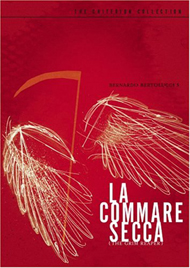| Release List | Reviews | Price Search | Shop | Newsletter | Forum | DVD Giveaways | Blu-Ray/ HD DVD | Advertise |
| Reviews & Columns |
|
Reviews DVD TV on DVD Blu-ray International DVDs Theatrical Reviews by Studio Video Games Features Collector Series DVDs Easter Egg Database Interviews DVD Talk TV DVD Talk Radio Feature Articles Columns Anime Talk DVD Savant HD Talk Horror DVDs Silent DVD
|
DVD Talk Forum |
|
|
| Resources |
|
DVD Price Search Customer Service #'s RCE Info Links |
|
Columns
|
 |
La commare secca
|
||||
Those leaping to get a glimpse at celebrated auteur Bernardo Bertolucci's first film should be forewarned that it's less a masterpiece than sort of a dry run for a tyro director trying his wings. Like all the new Italian directors of the late 50s and early 60s, the 21 year-old Bertolucci bounces his particular sensibility off of neorealism, and stages and shoots with a specific poetic stylization in mind. Today's film hopefuls looking for inspiration are likely to think that the director's ideas and even his approach aren't very imaginative, but Bertolucci has made an interesting movie out of very limited resources.
As a mystery, La commare secca is definitely lacking. The unfolding of clues is purposely unexciting and the eventual uncovering of the culprit an anticlimax. Working from a story idea by his mentor Pier Paolo Pasolini, first-time director Bertolucci goes in a personal poetic direction of his own, one that had to be commercially risky even in Italy's art-driven film world of the early sixties. The slowly moving story is really a series of barely-touching vignettes of varying interest. The purse snatcher is an immature weakling. Another suspect is a haughty gigolo living off the earnings of prostitutes. He remains impassive under the scorn of his main girl, a harpy that provides him with a sports car but keeps him like a bought dog. Together they hold one non-paying streetwalker's pet dog for ransom. The third suspect is a witless soldier harassing women on a day off in Rome, and a later pair of boys are trying to find ways to take their girlfriends on a dinner date without any funds. All of these episodes stand alone as well-drawn character sketches or visual exercises. The thread uniting them is a common rain storm, at which time Bertolucci cuts back to the victim-to-be rising from her bed to clean up, and looks out of her rainy window. The back-winding time structure has an affinity with Stanley Kubrick's The Killing and the dishonest testimony reminds us of Rashomon even though there's no ambiguity to Bertolucci's flashbacks, the visual component of which tells the truth. The various suspects all come together in a park where some contemplate crimes while others just try to get some rest. At 21 Bertolucci seems already determined to do what it takes to be a distinctive filmmaker. The camera hardly ever stops moving, searching for interesting visuals when not directly telling a story. This helps when the narrative leans toward aimlessness. It also lends an illusion of interrelatedness to the isolated men in the nighttime park, unaware that they will be linked to a crime. When the killing itself occurs, it seems an obligation rather than the central event. Although the portraits of young Romans are convincing and vivid, La commare secca doesn't involve us deeply in the problems of its characters - that moving camera keeps us emotionally aloof, perhaps. We're more likely to remember the casual venality and irresponsibility of the six or so young men on display. Criterion's DVD of La commare secca gives us another rare movie in an optimum presentation. Critic David Thompson's insert essay offers an objective critique while Bertolucci's video interview brings us the complete story straight from its personable (and extremely intelligent) director. He seems to have been the fair-haired son of a famous poet taken under the wing of another poet (Pasolini) immersed in the film world, but obviously somebody was impressed enough to put Bertolucci in charge of his own feature. It's a solid first effort and the perfect 'director's film': no stars, no commercial hook. The title has been translated as The Grim Reaper and critic Thompson identifies the quote from a poetic reference that depicts that mythical figure. But the actual words "commare secca" apparently mean "skinny gossip." One of Pasolini's key qualities was to introduce street dialects into Italian films, so this confusion seems appropriate - my wife, an Italian scholar, had a hard time recognizing some of the dialogue.
On a scale of Excellent, Good, Fair, and Poor,
La commare secca rates:
Review Staff | About DVD Talk | Newsletter Subscribe | Join DVD Talk Forum |
|
| Release List | Reviews | Price Search | Shop | SUBSCRIBE | Forum | DVD Giveaways | Blu-Ray/ HD DVD | Advertise |






